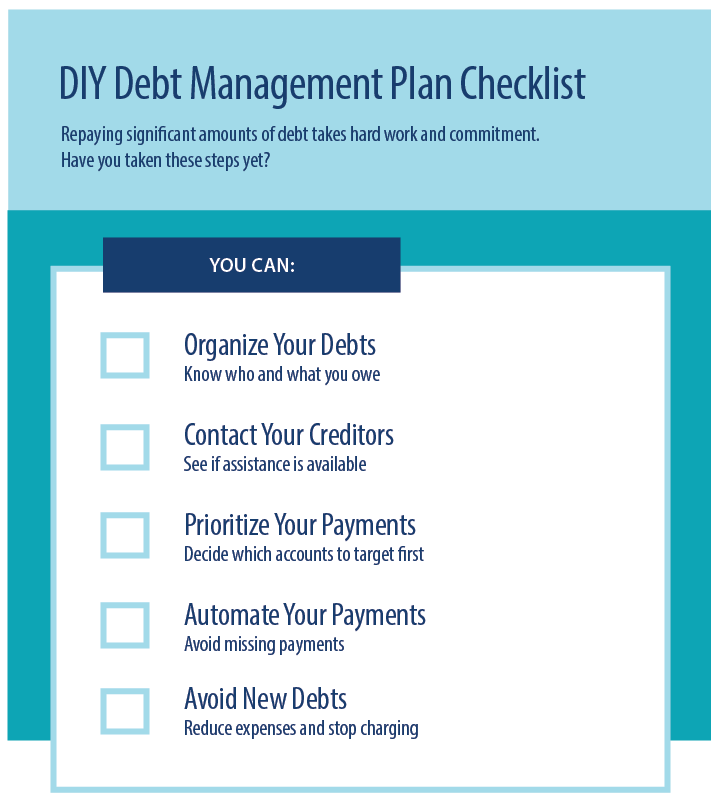A Complete Guide to Debt Management Plan Services for Debt Debt Consolidation
A Complete Guide to Debt Management Plan Services for Debt Debt Consolidation
Blog Article
Expert Tips and Methods for Implementing a Successful Debt Monitoring Plan
When it comes to navigating the complexities of financial obligation management, having a well-balanced strategy is crucial for attaining monetary security. From examining your present monetary standing to negotiating with financial institutions, each action plays a pivotal role in forming a successful debt management strategy.
Examining Your Current Financial Situation
Prior to embarking on a financial debt administration strategy, it is critical to thoroughly assess your current financial standing. Comprehending your monetary circumstance is the foundational action towards properly taking care of and minimizing your financial obligation.

Creating a Realistic Spending Plan
Understanding your current economic circumstance lays the foundation for establishing a sensible budget plan that straightens with your debt management goals and financial abilities. When developing a budget plan, it's important to accurately track your earnings, costs, and financial debt commitments. Start by detailing all incomes, consisting of wages, benefits, and any added revenues. Next off, detail your repaired costs such as rent or home mortgage repayments, energies, insurance policy, and financing settlements. Variable expenditures like grocery stores, entertainment, and transport ought to additionally be represented. By classifying your expenses, you can identify areas where you might need to cut down to liberate funds for financial debt repayment.
.webp)
Focusing On and Taking On Financial Obligations
To effectively gain back control of your funds and work in the direction of monetary security, focusing on and tackling your financial obligations is a critical action in your financial obligation administration plan. Start by detailing all your debts, including charge card, car loans, and any type of various other superior balances. Determine high-interest financial obligations that are costing you the most money and prioritize paying them off first. By concentrating on these high-interest financial debts, you can conserve cash in the future and reduce the overall amount you owe.
After determining your high-interest debts, think about using techniques like the financial obligation snowball or financial obligation avalanche method to pay them off systematically. The financial debt snowball method involves settling the smallest financial debts initially, while the debt avalanche method prioritizes financial obligations with the highest interest rates. Pick the method that aligns finest with your economic goals and inspires you to maintain making development.
Furthermore, take into consideration working out with lenders for lower rate of interest rates or establishing a payment plan if you're battling to meet your present commitments. Looking for support from a credit therapist or financial expert can additionally give beneficial insights and guidance on how to successfully tackle your financial debts - debt management plan services. By focusing on and addressing your financial obligations purposefully, you can lead the way towards a debt-free future and improved monetary well-being
Bargaining With Financial Institutions
When engaging in debt monitoring, bargaining with financial institutions is a critical action towards finding equally beneficial solutions for financial debt payment. Prior to initiating arrangements, it is necessary to have a clear understanding of your monetary situation, including your earnings, expenses, and the overall amount of debt owed.

Building Healthy Economic Practices
Incorporating constant budgeting practices navigate to this site is vital for growing healthy economic practices. Budgeting permits people to track their earnings and costs, enabling them to make informed choices about their financial priorities. Establishing particular financial objectives, such as conserving for emergency situations or retirement, can give a clear roadmap for managing cash successfully.
Another secret aspect of building healthy and balanced economic habits is living within one's methods. This includes spending less than what is made and avoiding unneeded financial obligation. Distinguishing and adopting a penny-wise attitude between needs and wants can aid people make even more prudent spending options.
On a regular basis keeping an eye on and evaluating monetary statements credit rating records are crucial routines that promote economic recognition and responsibility. By staying informed about their economic standing, individuals can recognize potential concerns early and take positive actions to address them.
In addition, developing a financial savings routine, despite having percentages, can contribute substantially to long-lasting financial safety. Saving on a regular basis not just builds a financial cushion for unanticipated costs but additionally cultivates a sense of self-control and responsibility in the direction of money administration. By constantly exercising these practices, people can lay a strong structure for a stable financial future.
Final Thought
In final thought, applying a successful financial obligation management strategy calls for an extensive assessment of one's financial circumstance, the development of investigate this site a realistic budget plan, prioritizing and dealing with financial obligations, working out with financial institutions, and building healthy and balanced financial practices (debt management plan services). By following these expert tips and strategies, people can take control of their funds and work towards attaining monetary stability and liberty from financial obligation
Understanding your present financial scenario lays the foundation for developing a practical budget that lines up with your financial debt monitoring objectives and monetary capabilities.To efficiently restore control of your funds and job in the direction of financial security, focusing on and tackling your financial obligations is a vital step in your debt monitoring plan.After determining your high-interest financial obligations, think about utilizing approaches like the debt snowball or debt avalanche approach to pay them off systematically. The financial obligation snowball technique involves paying off the smallest debts first, while the debt avalanche approach prioritizes financial obligations with the highest possible rate of interest rates.When involving in financial obligation administration, bargaining with creditors is a critical action towards discovering mutually beneficial services for financial debt settlement.
Report this page